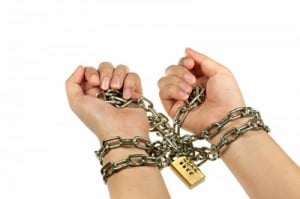 Many personal issues that plague us might make better sense if we realized up front that, deep down, we believe we deserve to be punished.
Many personal issues that plague us might make better sense if we realized up front that, deep down, we believe we deserve to be punished.
And our various emotions ills and problem behaviors serve that purpose.
If we approached things this way, then at least we’d be starting from a practical and productive place.
Instead, most of us try to solve personal issues by complaining about them. Then we engage in a never-ending game of cat and mouse with our psyche, which often leads to nowhere. I’ve done my share of this psychological cat and mouse routine.
What if we just stopped the psychological shenanigans and cut to the chase?
Deep down, you feel undeserving of better things. You may even feel worthless or that you are not a good person when it comes down to it. I can relate.
Now…
How are you punishing yourself?
Are you self-punishing in an obvious (direct) or not so obvious (indirect) way? Are you punishing yourself by making your life harder than it should be? Are you hanging out with the wrong people, being in the wrong job, doing exactly what you don’t want to do with your life in order to punish yourself and continue to feel undeserving?
Here are 20 more indirect ways that you could be punishing yourself. Are you:
1. Procrastinating your work until you feel overwhelmed, helpless and incompetent?
2. Making yourself fat by overeating every day?
3. Running away from wonderful opportunities to succeed?
4. Inviting untrustworthy, hurtful or unavailable people into your life?
5. Wasting your time doing stuff that doesn’t matter?
6. Drinking or doing drugs too much?
7. Refusing to ask for help when you need it?
8. Speaking out of turn or constantly putting your foot in your mouth?
9. Going along with others even when you disagree?
10. Withholding your true feelings so that nobody can really connect with you?
11. Allowing yourself to live in a disorganized, messy house that makes you feel bad?
12. Refusing to cooperate with others until they reject you?
13. Saying yes to every potential obligation until you feel like collapsing from the stress?
14. Denying yourself the opportunity to live your purpose?
15. Sabotaging your romantic relationships?
16. Shying away from potential friendships or isolating yourself?
17. Spending too much money?
18. Indulging in anger or resentment?
19. Telling yourself that happiness is a fantasy that can’t last?
20. Or, are you simply criticizing yourself endlessly, telling yourself what an awful failure you are and that nobody would ever approve of you if they only knew the truth?
Self-punishment. It’s an epidemic. It’s not just an individual concern, either. Communities and nations sabotage their own well-being on a consistent basis. And it all boils down to the same issue that every individual faces. And there are actually unlimited ways to do it.
We may even be so attached to self-punishment that we literally cannot control ourselves. It just happens on autopilot.
It has to end. It must end or we will allow our entire lives to go by without any period of lasting inner peace and enjoyment of our time. We’ll just keep punishing ourselves until our dying breath unless….unless we stop it.
How to end the cycle of self-punishment
Just stop. This is the most obvious solution, isn’t it?
Of course, so often we are more committed to self-punishment than our conscious willpower can handle. We can’t stop it because it is most obvious thing to do; what comes naturally and automatically. And it feels wrong (or weird or impossible or foreign) to stop with all the angst and simply enjoy life.
The idea of letting go and being happy – or doing what we truly want to do with our lives – brings up all kinds of fear, guilt, and justifications for why we “can’t.” It brings up painful thoughts, such as, “You don’t deserve it.”
In other words, you may not believe – at the deepest level – that you deserve to live any other way. That’s the awful message we give ourselves. Self-punishment.
Even stranger, often we get a subtle thrill out of it all. Or, we act as if enduring the punishment is some badge of honor. In short, our pain can make us feel special and we don’t want to give up that twisted sentiment.
So, we keep it up.
But think about this: What if you had no desire – ZERO TENDENCY – to criticize yourself, hold yourself back or believe you are less than? In other words, we wave a magic wand and, presto! You are healed and fully capable of living in peace, joy and success. Do you want that? What would your life be like?
I’ve asked these questions to lots of people who are embroiled in self-punishment. Common responses are:
• I don’t know.
• I’d have to be someone else.
• I can’t imagine – it seems like such a foreign idea.
• I’m not sure I want to stop.
• I don’t think I can stop.
Yes, self-punishment can become so ingrained that it feels like “who we are.” Even so, you need to stop punishing yourself if you want to be consistently happy, do you not? Yes, you do. And you can do it, even if you don’t believe it at this point.
Are you ready to stop punishing yourself and begin to enjoy life more?
The first step is to realize that this is precisely what you are doing. You may have learned to do it long ago. There may be a creepy voice in your head telling you that you deserve it. You may feel compelled and perhaps even strangely comforted by the punishment.
Yet, it is still YOU that is doling it out at this point in your life.
Once you realize your particular form of self-punishment, then you need tools to be able to stop. The tools included a greatly expanded self-awareness, a clear starting point, methods to interrupt the oh-so-compelling thought patterns and a new, punishment-free path in front of you.
I’ve put together a special email coaching course to help people down this all-important path. It’s a customized, non-automated series of emails that allows me to learn about you and guide you specifically to a punishment-free way of being. Click here to learn more.
If you like this article, then like my Facebook Page to keep up with all my writing.

